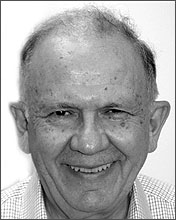Difference between revisions of "Morton Abramowitz"
m (reformat and relocate photo) |
m (add affiliation) |
||
| Line 38: | Line 38: | ||
*[[National Endowment for Democracy]] (NED) | *[[National Endowment for Democracy]] (NED) | ||
*[[The Century Foundation]] | *[[The Century Foundation]] | ||
| + | *[[The National Interest]] -- advisory council member | ||
==Resources== | ==Resources== | ||
*John B. Roberts II, "Roots of Allied Farce", The American Spectator, June 1999. | *John B. Roberts II, "Roots of Allied Farce", The American Spectator, June 1999. | ||
*{{note|dianaj}}Diana Johnstone, ''Fools Crusade'': Yugoslavia, NATO and Western Delusions, Pluto Press, 2002. (pages, 9-11, 221, 244). | *{{note|dianaj}}Diana Johnstone, ''Fools Crusade'': Yugoslavia, NATO and Western Delusions, Pluto Press, 2002. (pages, 9-11, 221, 244). | ||
Revision as of 09:34, 25 August 2006
Morton L. Abramowitz is an important integrant of the United States' foreign policy elite and has been a key player in determining recent U.S. foreign policy. He is on the board of several important organizations affecting US policy, e.g., NED.
This is what Diana Johnstone, the eminent left-journalist, had to say about him:
- "Presidents come and go but the continuity of U.S. policy is ensured by a small elite of policy-makers who remain outside party politics – and often outside public view. An influential member of this foreign policy establishment is Morton Abramowitz, whose career has involved him with both the Afghan mujahidin and Kosovo Albanian rebels. In 1986, as assistant secretary of state for intelligence and research in the Reagan administration, Abramowitz helped arrange delivery of the Stinger missiles. The collapse of the Soviet Union obliged U.S. policy-makers to redefine the "threat" justifying foreign intervention. The "war on terrorism", launched by President Reagan in the early 1980s, was suffering by the end of the decade from a dearth of active terrorists. As president of the Carnegie Endowment for International Peace in the early 1990s, Abramowitz headed a project to develop a new U.S. foreign policy for the post-Cold War era. Rather than simply identifying "threats", especially at a time when few threats could be seen, a successful new policy needed to combine promotion of U.S. interests with proclamation of American "ideals"...
—Diana Johnstone, p. 9[1].
Official Vitae
Morton Abramowitz is a Senior Fellow at The Century Foundation. He retired in 1997 as President of the Carnegie Endowment for International Peace and from the State Department in 1991. Ambassador Abramowitz also served in 1997-98 as Acting President of the International Crisis Group.
He joined the Foreign Service in 1960 after attending Stanford and Harvard, and serving in the United States Army. Prior to joining the Carnegie Endowment in August 1991, he was Ambassador to Turkey. He has also served as Assistant Secretary of State for Intelligence and Research, United States Ambassador to the Mutual and Balanced Force Reduction Negotiations in Vienna, Ambassador to Thailand, Deputy Assistant Secretary of Defense for Inter-American, East Asian and Pacific Affairs, Special Assistant to the Secretary of Defense, and Special Assistant to the Deputy Secretary of State. He also served in Hawaii as political advisor to the Commander-in-Chief, Pacific. He has the permanent title of career ambassador.
He is the author (with Richard Moorsteen) of Remaking China Policy, 1972; Moving the Glacier: The Two Koreas and the Powers, 1972; East Asian Actors and Issues, 1991; and China: Can We Have a Policy?, 1997. He was the editor and part author in 2000 of a book of essays: Turkey’s Transformation and American Policy. His most recent book with Stephen Bosworth is Chasing The Sun: Rethinking East Asian Policy Since 1992, he has published numerous articles and essays on subjects ranging from American foreign policy to issues in the former Yugoslavia. They have been published in The New York Times, The Washington Post, Newsweek, Time, International Herald Tribune, Christian Science Monitor, Wall Street Journal, Foreign Policy, Foreign Affairs and many others.
He is the recipient of numerous awards, including the Joseph C. Wilson Award for International Service from the University of Rochester in 1980, and the President’s Award for Distinguished Federal Service in 1981, 1985, and 1988. He also was awarded the National Intelligence Medal in 1989, the Director General’s Cup of the Foreign Service in 1995, and the Award For Lifetime Contributions to American Diplomacy of the American Foreign Service Association. He serves on the board of many non profit organizations, including the International Rescue Committee, the National Endowment for Democracy and the International Crisis Group.
(Source: Intl Crisis Group biography)
Important Chapters
Kosovo
Abramowitz acted as an "advisor" to the Kosovar rebels during the Kosovo conflict. This is what Diana Johnstone states about this relationship:
- "Abramowitz continued to act from behind the scenes as an eminence grise for Albright. He helped found the high-level International Crisi Group, a chief policy designer for Bosnia and Kosovo. He was omnipresent behind the scenes of the Kosovo drama, both in making policy and in shaping elite business, government, and media opinion. He acted as an advisor to the Kosovo Albanian delegation at the Rambouillet talks, whose programmed breakdown provided the pretext for the NATO bombing.
The same group of advisors that theorized military intervention for "humanitarian" reasons went on to make it happen...[2] pp. 10-11.
Affiliations
- Carnegie Endowment for International Peace former president
- Human Rights Watch
- International Crisis Group co-founder
- International Rescue Committee
- National Endowment for Democracy (NED)
- The Century Foundation
- The National Interest -- advisory council member
Resources
- John B. Roberts II, "Roots of Allied Farce", The American Spectator, June 1999.
- ^Diana Johnstone, Fools Crusade: Yugoslavia, NATO and Western Delusions, Pluto Press, 2002. (pages, 9-11, 221, 244).
